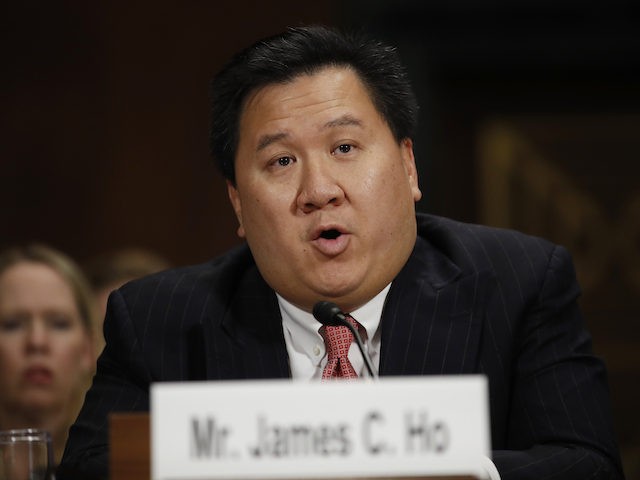James C. Ho, a Taiwan-born judge on the U.S. Court of Appeals for the Fifth Circuit, penned a powerful concurring opinion condemning the perverse critical race and disparate impact theories, saying of their advocates that “requiring discrimination may not be a problem — it may be the whole point.”
“Congress enacted Title VI of the Civil Rights Act of 1964 to prohibit intentional racial discrimination,” he began, “not to restrict neutral policies untainted by racial intent that happen to lead to racially disproportionate outcomes.”
“There’s a big difference between prohibiting racial discrimination and endorsing disparate impact theory,” he continued, describing how critical race theorists attempt to supplant the American ideal of equality with their nefarious conception of equity. “It’s the difference between securing equality of opportunity regardless of race and guaranteeing equality of outcome based on race. It’s the difference between color blindness and critical race theory.”
Continuing further, Ho contrasted Martin Luther King, Jr.’s famous line, “I have a dream that my four little children will one day live in a nation where they will not be judged by the color of their skin but by the content of their character,” with prolific critical race theorist Ibram X. Kendi’s saying, “A racist policy is any measure that produces or sustains racial inequity between racial groups.”
“Prohibiting racial discrimination means we must be blind to race,” Ho wrote, diving further into his analysis of the ideology. “Disparate impact theory requires the opposite: It forces us to look at race — to check for racial imbalance and then decide what steps must be taken to advance some people at the expense of others based on their race. But racial balancing is, of course, patently unconstitutional,” quoting a Supreme Court case. (Emphasis added).
The judge then illustrates the apparent social prescription advocated by proponents of disparate impact theory, saying they believe that it “can help ‘uncover discriminatory intent’ and ‘counteract unconscious prejudices and disguised animus’ or ‘covert and illicit stereotyping’ that ‘escape easy classification as disparate treatment.'”
Ho, an appointee of former President Donald Trump, did not appear to be convinced of the efficacy of the prescription, however, pointing out that “a presumption of discrimination runs into a bedrock principle of our legal system. We ordinarily assume innocence, not bigotry. Plaintiffs must typically prove, not presume, discrimination.” (Emphasis added).
Channeling a dissent by U.S. Supreme Court Justice Clarence Thomas — for whom he formerly worked as a law clerk — Ho wrote, “We should not automatically presume that any institution with a neutral practice that happens to produce a racial disparity is guilty of discrimination until proved innocent.”
“[O]pponents of disparate impact theory worry that it will only exacerbate, rather than alleviate, racial tension — by pressuring defendants to adopt policy changes for the explicit purpose of taking from some and giving to others based on their race,” he noted, saying “They fear that disparate impact theory means not only presuming discrimination, but requiring it.” (Emphasis added).
Ho also included a portion of a concurring opinion by the late Supreme Court Justice Antonin Scalia, pointing out that “disparate-impact provisions place a racial thumb on the scales, often requiring employers to evaluate the racial outcomes of their policies, and to make decisions based on (because of) those racial outcomes.”
“So these are not frivolous concerns of discrimination that we’re talking about here,” he wrote pointedly. “In fact, for disparate impact advocates, requiring discrimination may not be a problem—it may be the whole point.” (Emphasis added). Quoting “leading critical race theorist” Kendi, Ho appeared to prove his hypothesis: “‘[t]he only remedy to past discrimination is present discrimination,’ and ‘[t]he only remedy to present discrimination is future discrimination.'”
“It’s hard to imagine an area where we should be more wary of vesting discretion in public officials than race,” Ho surmised. “Our Nation’s history is replete with tragic lessons in this regard. We have learned the hard way to distrust those who claim they’re using race for benevolent, rather than nefarious, ends.”
“So public officials may sincerely believe that race-conscious policies are beneficial rather than corrosive. But the American people have never been the blindly trusting sort,” he said, pointing out public concern over the hypocrisy in the political narrative of disparate impact proponents:
Citizens may fairly wonder how officials can condemn race-neutral policies as racist and defend explicitly race-conscious programs as inclusive. Citizens are understandably skeptical when government officials claim that they’re just here to help — but then declare that up is down, left is right, race consciousness is good, and race neutrality is bad. [Emphasis added].
“It’s said that the road to hell is paved with good intentions,” Ho wrote in conclusion, “That’s why we have laws on the books, like Title VI, that simply forbid the ‘sordid business’ of ‘divvying us up by race’—no matter what our intentions.”
The case is Rollerson v. Brazos River Harbor Navigation District of Brazoria County Texas, No. 20-40027 in the U.S. Court of Appeals for the Fifth Circuit.

COMMENTS
Please let us know if you're having issues with commenting.